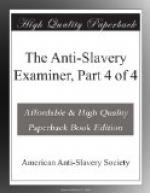[Footnote 34: Verse 16.]
[Footnote 35: Verse 10, 16, 17.]
[Footnote 36: Verse 16.]
It is easy now with definiteness and certainty to determine in what sense the apostle in such connections uses the word “brother”. It describes a relation inconsistent with and opposite to the servile. It is “NOT” the relation of a “SERVANT.” It elevates its subject “above” the servile condition. It raises him to full equality with the master, to the same equality, on which Paul and Philemon stood side by side as brothers; and this, not in some vague, undefined, spiritual sense, affecting the soul and leaving the body in bonds, but in every way, “both in the FLESH and in the Lord.” This matter deserves particular and earnest attention. It sheds a strong light on other lessons of apostolic instruction.
9. It is greatly to our purpose, moreover, to observe that the apostle clearly defines the moral character of his request. It was fit, proper, right, suited to the nature and relation of things—a thing which ought to be done.[37] On this account, he might have urged it upon Philemon in the form of an injunction, on apostolic authority and with great boldness.[38] The very nature of the request made it obligatory on Philemon. He was sacredly bound, out of regard to the fitness of things, to admit Onesimus to full equality with himself—to treat him as a brother both in the Lord and as having flesh—as a fellow man. Thus were the inalienable rights and birthright privileges of Onesimus, as a member of the human family, defined and protected by apostolic authority.
10. The apostle preferred a request instead of imposing a command, on the ground of CHARITY.[39] He would give Philemon an opportunity of discharging his obligations under the impulse of love. To this impulse, he was confident Philemon would promptly and fully yield. How could he do otherwise? The thing itself was right. The request respecting it came from a benefactor, to whom, under God, he was under the highest obligations.[40] That benefactor, now an old man, and in the hands of persecutors, manifested a deep and tender interest in the matter and had the strongest persuasion that Philemon was more ready to grant than himself to entreat. The result, as he was soon to visit Collosse, and had commissioned Philemon to prepare a lodging for him, must come under the eye of the apostle. The request was so manifestly reasonable and obligatory, that the apostle, after all, described a compliance with it, by the strong word “obedience."[41]
[Footnote 37: Verse 8. To [Greek: anaekon]. See Robinson’s New Testament Lexicon; “it is fit, proper, becoming, it ought.” In what sense King James’ translators used the word “convenient” any one may see who will read Rom. i. 28 and Eph. v. 3, 4.]
[Footnote 38: Verse 8.]
[Footnote 39: Verse 9—[Greek: dia taen agapaen]]




